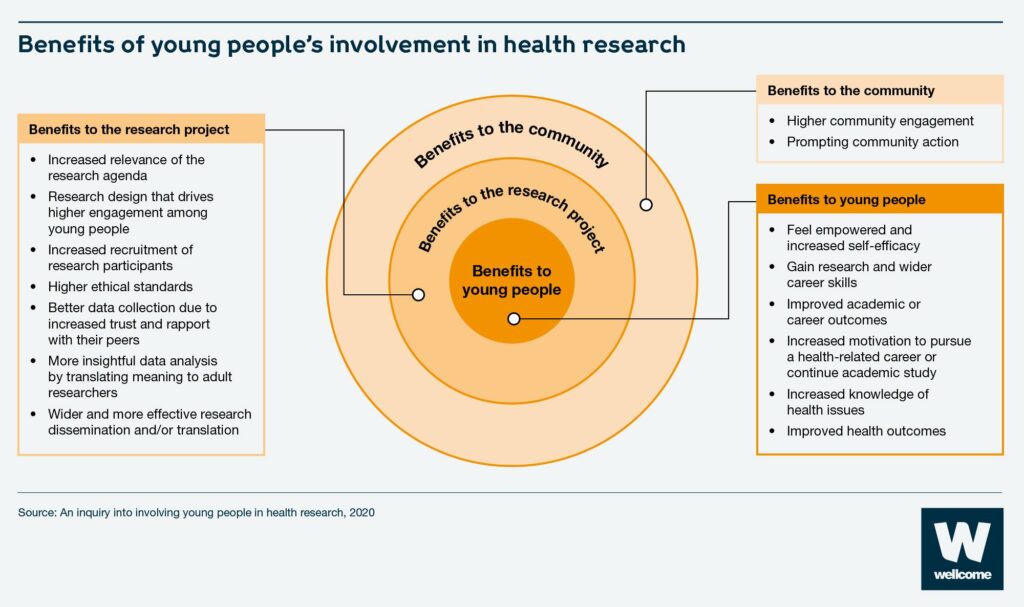Dalberg uses cookies and related technologies to improve the way the site functions. A cookie is a text file that is stored on your device. We use these text files for functionality such as to analyze our traffic or to personalize content. You can easily control how we use cookies on your device by adjusting the settings below, and you may also change those settings at any time by visiting our privacy policy page.
Young people’s views, knowledge and experience are crucial to health research — from which they are often excluded. In partnership with Wellcome Trust, Dalberg Advisors and Dalberg Design conducted a study that built a case for why young people’s involvement is critical to both research outcomes and community awareness of health-related challenges.
Health researchers around the globe are facing a growing number of calls to involve more young people in the health research process — as active co-creators of new knowledge rather than passive participants whose experiences are interpreted by parents, caregivers, or other stakeholders.
The case for greater youth involvement is clear: Young people are disproportionately affected by key health challenges and will have to live with them longer.
As the core of our future society and workforce, these voices should be moved from the sidelines and into the center of health research.
Demographics underscore the need to include young people’s voices in outputs that will shape the global health outlook. Out of every five people, two are under 24 years old. There are 1.8 billion people in the world aged 10–24, with almost 90% of them in low-income countries.
Mapping Out the Potential For Youth Involvement
Together, Dalberg and Wellcome, a charitable foundation focused on health research, took a first step in examining what it would take to build an environment that incorporates young people’s perspectives in a report titled “Involving Young People in Health Research.” They examined purposeful youth involvement along the research chain, honing in on three areas: mental health, infectious disease, and the impacts of global heating.
Through a rapid evidence review (RER) and stakeholder consultation, Dalberg and Wellcome’s goal was to develop a framework for integrating young people as health research actors, while understanding how best to support them.
The study analyzed 187 peer-reviewed articles published since 2005, and engaged 146 stakeholders from 18 countries, including young people from low- and middle-income countries — India, Indonesia, Kenya, Senegal, South Africa, and Vietnam.
The RER revealed several roles young people can play at different stages of the research cycle. Stakeholders working in diverse geographic and health research contexts also provided examples of what youth involvement entails in practice.
The Benefits of Building a More Inclusive Health Research Ecosystem – and the Challenges That Remain
The study hints at the promise of incorporating young people in health research — it benefits not only them, but their communities and the research itself. Young people can better identify questions and methods that suit their needs. Participation often cultivates a sense of empowerment, and in turn catalyzes awareness and action in the places they live.
But challenges remain. There are too few opportunities for young people to contribute to research, and there is a lack of standardized language and methodologies for documenting the impact of youth participation. Furthermore, sustaining youth engagement throughout the process can be difficult. Researchers will also need to tailor new methods, training and guidance to people from diverse backgrounds and cultures.
Additional barriers pose a threat to broadening inclusiveness. Young people from low-income countries have less free time, and cultural norms on gender roles in some geographies make it more challenging for women and girls to participate. And young people with disabilities or chronic conditions are less likely to be involved because their needs are not accommodated.
The Building Blocks to a Better Research Future
So what’s next for organizations who want to strengthen young people’s involvement in health research? In “Involving Young People in Health Research”, Dalberg and Wellcome provide a number of practical recommendations towards collective action and targeted investment. These include developing a new standard among funders dedicated to driving youth involvement, including the recommendations around why young people should be brought into the internal agenda-setting and funding decisions. The report also makes an argument for formalizing networks around the cause to help speed up progress, and offers that stakeholders can also shape opportunity by sharing more evidence of the impact of youth participation in research.
The actions recommended in the study will need to be the work of a large cohort of stakeholders. This will include academics, CBOs, NGOs and other community representatives, funders in health research and networks of experts that have been created to address this issue.
There is good cause for optimism — more health research involving young people is being published today than five years ago, and an increasingly wide range of experts recognize the importance of this approach.
The evidence generated by this study could reinforce this momentum, while also underscoring the need for targeted investment and continued effort to overcome the challenges that go with involving young people effectively.
The report can be downloaded here.


